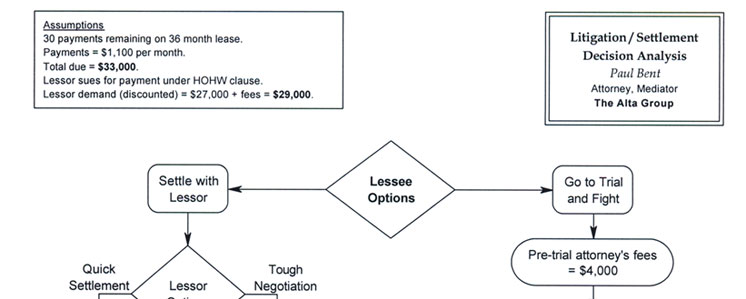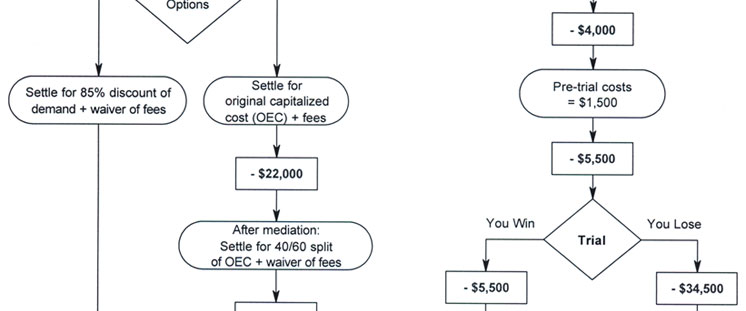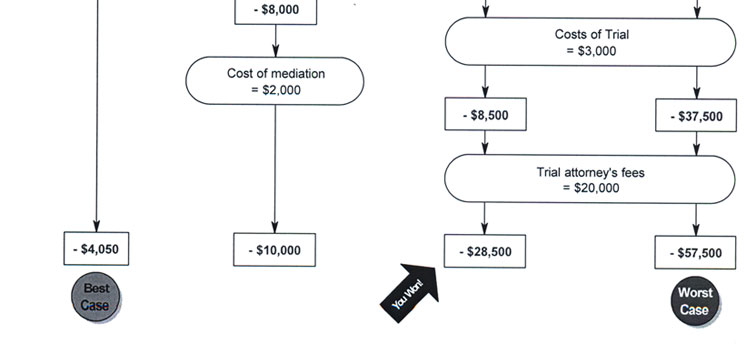|
|
Settlement Costs Vs. Litigation Costs Leasing News has asked over a dozen well-known leasing attorneys to comment on the prospective costs a lessee may encounter, what the "typical" costs might be in defending their position ( which they should consider along with the 85% settlement many have been offered—many are telling me it is not "enough." The premise was to find experienced and recognized attorneys who were not representing any NorVergence lessor, so there would not be a “conflict of interest.” While it may be claimed that these attorneys perhaps represent more leasing companies than lessees, which may most likely be true, they do have experience in understanding the costs involved in this type of specific litigation. Contesting a matter should not be viewed in a “political manner” but in the view of “financial costs.” To understand the requirements of your time, and its value, the first consideration should be on the attorney costs. One of the first attorneys to respond was Paul Bent of the Alta Group. He is one of the attorneys who advertises (for free) on our classified ad page of those who specialize in the leasing industry: “Paul Bent, helping settle deals that have gone bad. Attorney for 20+ years with GoodSmith & Co., now providing mediation and dispute resolution for lessees and lessors. www.paulbent.com” His costs were very much on the low side, compared to otherfigures that we received. They also reflected other attorneys who thought figures we started with were too high ( although others said it was not high.) Paul Bent was kind enough to communicate with this diagram:
“As you can see (and as you already know), the costs and risks of trial are simply not worth it in deals of this size. “It's interesting to note that the bottom line options for the Lessee are about the same as in the other chart. Whether you analyze the case from the standpoint of Lessee's options or from the standpoint of probabilities, the result for a deal of this size is going to be about the same. “What the Lessees have to see is that these decisions cannot be based on emotion or anger. There's no “right” or “wrong” in this analysis; there's only an objective financial decision that takes into account all the risks, all the costs, and all the (minimal) potential benefits of fighting big companies with lots of lawyers at their disposal. Remember, even if you win, you're not going to get back to where you started. “In a perfect world, the bad guys in this situation would be punished and would have to pay everyone back (Lessors and Lessees) for their wrongdoing. But, as they say in the Walgreen's commercials, “we don't live anywhere near Perfect.” The Lessees just have to deal with their anger in some other way. If they want to save their businesses and move on with their lives, they should sit down with the Lessors and try to make a deal; or, if the Lessors are not willing to talk directly, they should bring in a neutral third party to talk with the Lessors and work out a deal everyone can live with. “Hope this helps. And I'd be glad to continue the dialog if there's anything else I can do.” P A U L B E N T T h e A l t a G r o u p --Next issue: What other attorneys who specialize in the leasing field think the costs would be--- ---------------------------- Part II By Christopher Menkin
Leasing News has asked over a dozen well-known leasing attorneys to comment on the prospective costs a lessee may encounter, what the "typical" costs might be in defending their position. The original idea was to help those make a business decision regarding the 85% settlement many state attorney generals have obtain for NorVergence lessees. An analysis of the actual settlements was included in yesterday's edition: http://www.leasingnews.org/#norv1 It was followed by a diagram to show costs as estimated by attorney Paul Bent: http://www.leasingnews.org/#costs This was not the analysis of a class action suit or a group effort, but a specific case if you are called into court. Contesting a matter should not be viewed in a “political manner” but in the view of “financial costs.” While it does not preclude wanting to change society, this can be done in many ways, including getting more involved in local, state, and federal elections. This is really a “dollar cost analysis” To understand the requirements of your time, and its value, the first consideration should be on the attorney costs. From my experience in the leasing business for 34 years, being on both sides in front of a judge, plus my role as a “legal expert” for the last thirty years ( in the last three cases that I charged my time, one was four hours at $300 an hour to review the cases, and discuss positions over the telephone with the attorney who hired me; the other was settled before the trail and I had been paid $6,000 to date; the third is pending, and I have received $8,000 to date, plus the attorney has a second legal expert, academic, who's billing rate is much higher than mine. So it really depends on the cost to prepare to win. ) Paul Bent estimated $28,500 to $57,000. My estimate was from from 64 hours to 120 hours. This does not include if there are legal experts or more than two depositions, and the matter is somewhat simple. It could be 150 hours or more. My estimate was $19,400 to $36,000. Multiply times the hourly cost of your attorney ( he also may use assistants which may cut time down, and/or add, as they do further research on legal matters involved.) As a rule of thumb, for $200 an hour, it is: $12,800 to $24,000; $250 an hour: $16,000 to $30,000; $300 an hour: $19,400 to $36,000. Senior Partners receive $450 an hour. They are usually involved in much larger cases. As a rule of thumb, attorneys have told me going to court is not worthwhile for any dollar amount under $30,000 in contention ( the exception would be when you represent yourself in small claims court. ) ( 4-6) Attorney review of matter: four to six hours, does not include research (1-2)Attorney discussion with opposing attorney: one to two hours (2-8) possible research, reviewing matter: two to eight hours (2-8) Attorney answering complaint: two to eight hours (2-8) Discovery ( asking for documents, going back and forth for reasons, definitions, perhaps need to subpoena for deposition (2-8) review of documents, discussion. (2-16) Perhaps filing a summary of motion to dismiss from documents gathered or other rulings or other matters in the case; sometimes this also results in settlement talks. (2-4)A deposition requires meeting with your attorney before to cover what to expect: two to four hours, plus travel time (4-6)Deposition: four to six hours, plus travel time ( 2 + 2 )Review of deposition, any corrections: attorney time: two hours Your time: two hours (1-2) Discussion with attorney: one to two hours (1-2)Discussion with attorney re: deposition of opposing party: one to two hours. (4-6)Deposition of opposing party: four to six hours, plus travel (1) Discussion with attorney regarding deposition Cost of shorthand reporter If there is a "legal expert" from the opposing party, repeat above. If there are other "witnesses," repeat above. If there is a second attorney representing another company named, repeat above (2-6) appearance in court to set hearing ( plus travel, lot of waiting time to be heard, perhaps. If more than two attorneys, perhaps postponements. (2-6) discussions with attorneys and yourself during time period (8) Settlement hearing, usually judge requires before a trial (24) Trial, usually two to three days, depends if a hearing by the judge or the requirement of a jury, meaning selection, etc. ) Does not include court costs, which could be $3,000 to $5,000????? Most of the attorneys who I asked for their opinion thought I was too low, agreeing more with Paul Bent's estimate ( note: it was not shared with them. They came to a similar conclusion without seeing his diagram or estimated costs. They were only shown my estimate above.) “This is a very thoughtful analysis, and you are right that legal costs are a major consideration. For experienced litigators in Chicago, New York and DC, the hourly rates could easily range from $350-700 per hour unless a class action approach is taken and I don't have any idea on pricing there. This input is obviously off the record.” ( name with held ) “64 hours is not high for a full fledged defense if trial is involved.” Wagner and Zielinski “I would add that I agree with your approach. “Thanks for your attention to this important matter. As you may know, I am very interested in the changes in our industry that may result, such as recognition that D&A's should never be signed in advance of delivery and actual inspection and increased scrutiny of vendors by lessors.” ( name with held ) “ Responding to your inquiry, I find it exceedingly difficult to "ballpark" legal fees at the inception of a defense matter inasmuch as it is largely a function of the aggressiveness and continued lack of cooperation of opposing counsel. “ It also depends upon how reasonable and realistic the parties are going into the case - if it is a matter of "principle"; I have been associated on a case in which one of the parties spent over a quarter of a million dollars to achieve an award of $ 13,000. Also, as everyone knows, unfortunately our jurisprudence systems and codes contain a myriad of different authorized procedural maneuvers that would make the cost of litigation far more expensive with each one used: for example, you estimated time for discovery, but that could in reality be exponentially greater if it requires a motion to compel for every single method of discovery used, such as interrogatories, requests for admission, depositions, subpoenas, etc., where the opposing party/counsel does not provide you with good faith responses and you require court assistance just for that. “ Certainly, however, you are correct that in evaluating any settlement the potential costs and fees should be factored into the decision.” Ellen M. Stern, Esq. “Should this go to trial, $50,000 would not be unreasonable in a contested matter.” (name with held) “I think you are much too low as there are other circumstances that are most likely to occur that will mean more hours and thus more cost.” (Name with Held) “I think competent representation could be had for less time. Of course, it depends entirely on the circumstances. But I think that (Name With Held) “I agree with what you state for the most part. I do think that some of the legal costs may be underestimated. Here's how I would estimate a straight forward matter involving one plaintiff and one defendant (keeping Kit's format and highlighting the changes in time): 4-6 hours: Attorney review of matter/investigation (does not include research) 1-2 hours: Attorney discussion with opposing attorney to see if mater can be resolved without having to litigate 2-8 hours: Possible research, reviewing matter to determine all defenses 2-8 hours: Answering complaint (more time may be needed if a counterclaim is appropriate or you need to add an additional party) 5-10 hours: Discovery (propounding written discovery and responding to discovery from other party) 5-10 hours: Review of documents (both ours and theirs). 5-20 hours: Filing a summary of motion to dismiss or responding to Plaintiff's motion for summary judgment and argument before the court (includes obtaining necessary affidavits) (these motions also often result in additional settlement talks). DEPOSITIONS: Assuming at this point only one deposition per party: 2-4 hours per deposition: Meeting with your attorney before your deposition to cover what to expect (plus travel time as needed) 4-8 hours (plus travel time) per deposition: Deposition (Most courts allow up to 8 hours per deposition, especially of a party. This is only the time during which the deposition is taken, and does not include breaks. Some courts will allow longer depositions if the party taking the deposition can show cause why a longer deposition is needed). 2 hours: Review of deposition, any corrections. You should also consider 2 hours of your time. 1-2 hours: Discussion with attorney about deposition and strategy going forward. 1-2 hours: Discussion with attorney re: deposition of opposing party's witnesses. 4-8 hours (plus travel time): Deposition of opposing party (see discussion above re: time allowed by courts for depositions) 1 hours: Discussion with attorney regarding deposition NOTE: This does not include the costs of the court reporter/stenographer. That costs will vary depending on the length of the deposition. If there are other "witnesses," repeat above. If there are other parties, repeat above for each party. If the plaintiff hires an expert, you may need an expert to counter his/her opinion. The time for the actual depositions will be the same; however, there will be additional time to assist the expert in preparing his report, to prepare him for the deposition, to review his report and the report of the opposition's expert and, perhaps, to file motions to exclude the expert's testimony. You also must consider the expert's fees, which will vary depending on the expert and the type of opinion sought. 4-10 hours: Appearances in court (hearings, status conferences, etc. -- includes a lot of waiting time to be heard, perhaps). 5-10 hours: Attorney-client meetings and discussions. 8 hours: Settlement hearing/mediation (often required by a judge before a trial). If a formal mediation, add 2 hours to prepare mediation statement. 10-20 hours: Trial preparation 16-24 hours: Trial, usually two to three days (depends if a hearing by the judge or the requirement of a jury (including jury selection) etc. ) This would assume 1 lawyer handling the case and does not include expenses. I noted the court reporters' costs above. This also does not include copying charges, long distance, other travel time, faxing changes, etc. I would estimate in a simple matter without a huge number of documents, an additional $2000 to $3500 (again, not including court reporters' costs or legal experts' fees). I hope this is helpful. Let me know if I can do anything further.” Ellen www.bakerdonelson.com <http://www.bakerdonelson.com> These are the legal costs, and do not include your involvement: your time. If you are a salaried employee of a corporation, you should then know the hourly rate you are paid. If you own the corporation, or an a principal, and share in the corporate profits or other corporate benefits, this should also be included in the hourly rate. For purposes of partnerships and proprietorships, divide what you draw in a year into 12 months, then divide that by 168 hours ( you may work more, or less, but that is the standard work month.) Depositions: You need to include your time and travel, plus review of the record. More than likely you will also go to the opposing side depositions as you may be of help to your attorney in this process, plus you will learn first hand more about the case. Court appearances: You may not need to make all the appearances, meaning hearings for requests for continuance or new dates, but certainly all matters that involve you directly, you will have to be there, including waiting time. Attorney-Client Meetings: Some by telephone, others in person, and most likely you will drive to your attorneys office to meet there. There will be many throughout the course. Settlement hearing: Most judges require this before actually picking a jury and starting the process. Trial: Waiting, the actual trial, meetings afterwards. This adds up to a minimum of 45 hours or go as high as 114 hours. Multiply this times what your hourly worth is. Don't forget, you or the opposition may want to appeal the ruling. Add another 30 to 60 hours.
|





